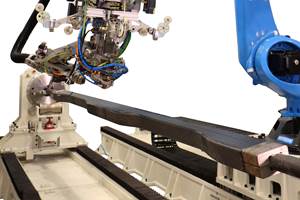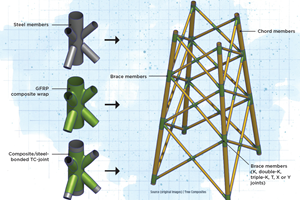Exel Composites and CNIM partner on glass fiber components for world's largest fusion facility
Fiberglass components to be used for the magnet support structure of the International Thermonuclear Experimental Reactor (ITER).
Global pultrusion company Exel Composites (Vantaa, Finland ) announced March 21 it is collaborating with French industrial contractor CNIM (Île-de-France, France) on the manufacture of fiberglass components for the magnet support structure of the International Thermonuclear Experimental Reactor (ITER), the world’s largest experimental fusion facility. To satisfy the stringent quality demands for the pre-compression rings, Exel Composites successfully solved the challenge of producing defect-free pultruded profiles of around 3 km in length.
The €18 billion ITER under construction in Saint-Paul-lez-Durance, France, is designed to demonstrate that fusion power can be produced on a commercial scale, providing a safe, environmentally sustainable energy source. The ITER will use hydrogen fusion, controlled by superconducting magnets, to produce massive heat energy. In the commercial machines that will follow, this heat will drive turbines to produce electricity.
The composite pre-compression rings are the cornerstone of the ITER’s magnet system support structure. They will ensure the operation of the toroidal field coils employed to create a magnetic 'cage' to confine the super-hot (150 million °C) plasma. To reduce fatigue and deformation of the coils resulting from the powerful magnetic fields, three pre-compression rings will be placed on top of them and three below. An extra set of three will be manufactured in case replacement becomes necessary in future. The pre-compression rings are required to withstand maximum hoop stresses of up to 500 MPa at room temperature. Glass fibre epoxy composite with a high fibre content was selected as the most suitable material to withstand such extreme loads, avoid circulation of electromagnetic currents and deliver a long service life. The composite rings will have a diameter of approximately 5 m, a cross-section of nearly 30 cm x 30 cm and will weigh slightly more than 3 tons.
Engineers at CNIM’s workshop in Toulon have been tasked with developing a manufacturing process for the spare pre-compression rings, and their subsequent production. The novel process relies on pultruded composite profiles produced by Exel Composites. Each ring will be produced by winding a 2 mm thick, 2.8 km long, flat pultruded profile around a metal tool. A 0.12 mm thick epoxy adhesive tape is wound over each layer. The completed ring lay-up is cured and then machined to the required final dimensions.
CNIM selected Exel Composites for this project based on the company’s proven capability in the manufacture products of superior quality for the most demanding applications. Exel formulated a high performance epoxy resin system to meet the mechanical specifications for the pre-compression rings and ensured that the 3 km profiles supplied were defect-free along their entire length by means of online non-destructive testing (NDT). The handling of this length of profile presented a further challenge, which Exel solved by winding the product on a customised bobbin for supply to CNIM.
CNIM has already manufactured a series of prototypes, which are currently undergoing NDT and qualification tests. Production of the full-scale pre-compression rings will begin later this year. “We are proud to support the ground-breaking ITER demonstrator as it prepares the way for the fusion power plants of tomorrow,” states Kari Loukola, Senior Vice President, Sales & Marketing, Exel Composites. “This represents a further example of Exel’s commitment to innovation and collaboration with our customers in the pursuit of new applications for composite materials.” The ITER facility itself is now 50% complete, with First Plasma (machine switch on) scheduled for 2025. ITER scientists predict that fusion plants could start to come on line as soon as 2040.
Related Content
Composite resins price change report
CW’s running summary of resin price change announcements from major material suppliers that serve the composites manufacturing industry.
Read MoreCOMPINNOV TP2 project promotes use of thermoplastics in aerospace
Completed in 2023, COMPINNOV TP2 explored thermoplastic composites, enhancing the understanding between prepregs and production methods to foster the potential for French aerospace innovation.
Read MoreMFFD thermoplastic floor beams — OOA consolidation for next-gen TPC aerostructures
GKN Fokker and Mikrosam develop AFP for the Multifunctional Fuselage Demonstrator’s floor beams and OOA consolidation of 6-meter spars for TPC rudders, elevators and tails.
Read MoreNovel composite technology replaces welded joints in tubular structures
The Tree Composites TC-joint replaces traditional welding in jacket foundations for offshore wind turbine generator applications, advancing the world’s quest for fast, sustainable energy deployment.
Read MoreRead Next
All-recycled, needle-punched nonwoven CFRP slashes carbon footprint of Formula 2 seat
Dallara and Tenowo collaborate to produce a race-ready Formula 2 seat using recycled carbon fiber, reducing CO2 emissions by 97.5% compared to virgin materials.
Read MoreDeveloping bonded composite repair for ships, offshore units
Bureau Veritas and industry partners issue guidelines and pave the way for certification via StrengthBond Offshore project.
Read MorePlant tour: Daher Shap’in TechCenter and composites production plant, Saint-Aignan-de-Grandlieu, France
Co-located R&D and production advance OOA thermosets, thermoplastics, welding, recycling and digital technologies for faster processing and certification of lighter, more sustainable composites.
Read More













.jpg;maxWidth=300;quality=90)











